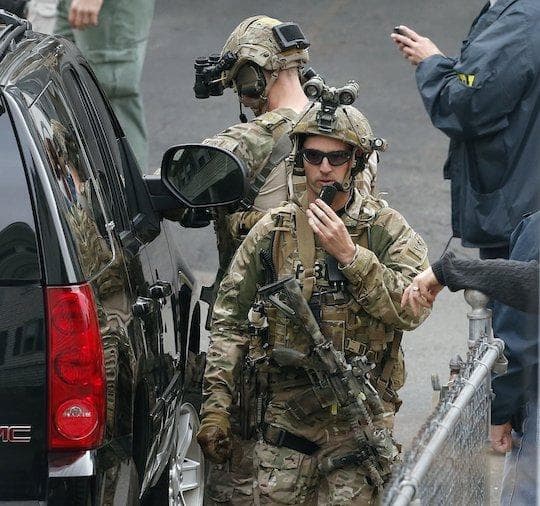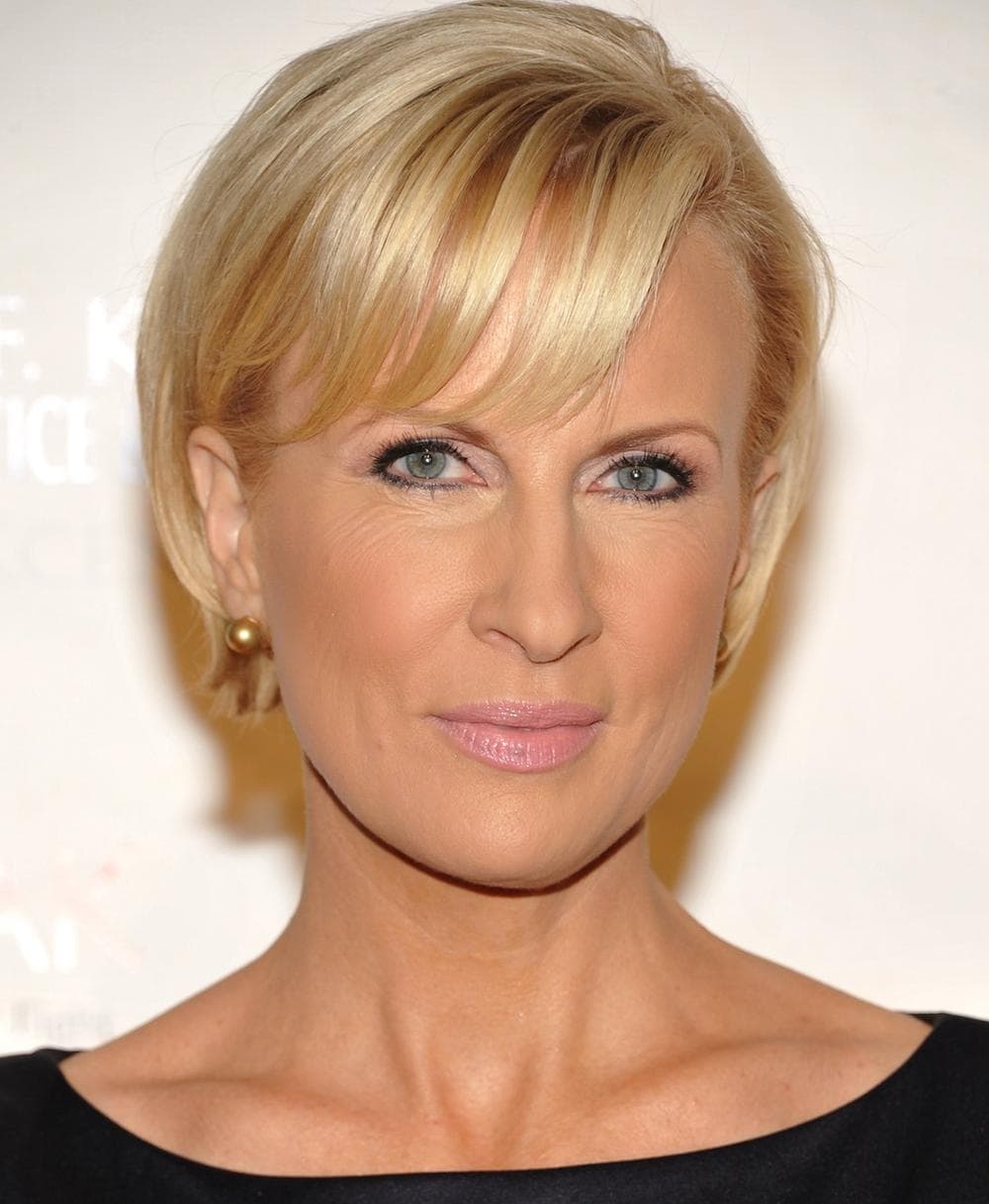Advertisement
TV Coverage Of Manhunt: Unprecedented, But Just Like It Used To Be
Just when you thought things couldn’t possibly get any crazier on television, when the biggest issue on morning television was whether Matt Lauer would lose his job on “The Today Show,” we turn on the TV in the morning and …
Watertown is in lockdown?
Boston is in Shelter In Place? What the hell is Shelter In Place?
The suspected bombers are brothers from Watertown, the younger 19-year-old “a normal kid” according to classmates?
And then, again, just as you thought it was safe to shut off the TV and go about your business Friday night, the "normal kid" is discovered in a boat in Watertown.
As a television critic for the Boston Globe in the ‘80s and ‘90s I would frequently have to drop what I was doing and see how television was covering everything from hurricanes to the kidnapping of Mikhail Gorbachev. But on Friday, when reporters used the word “unprecedented” to describe the unfolding of events, a word they often misuse, it was impossible to take issue with them.
Had we seen anything like it? Speculation turned to the two young men maybe being part of a Chechen sleeper cell, as on “The Americans,” about Russian agents in America during the Cold War. If only it were that simple, Bill O'Reilly.
Speculation has, of course, run rampant since the Marathon bombing, particularly on the 24-hour-news cycle. First a black man had been fingered. (Must be a radical Muslim, probably with Arab roots.) No, they were Caucasian. (Must be homegrown terrorists, like Oklahoma City.) Whatever their affiliation, they must be long gone.
About the only thing that turned out to be true was that they were so Caucasian that their roots are in the Caucasus. Which means that they actually might be affiliated with radical Muslims. Or not.
Still, with all the speculation, I have to salute our brothers and sisters on television, at least most of them. TV news has taken as many hits as newspapers in recent years, as viewers have drifted to the Internet, social media, commentary shows, and – of course – public radio.
So for all the unprecedented nature of what was happening, it was kind of an old-school event, in which everyone turned to television as a national hearth, or more particularly a local hearth. How could you turn away from the unraveling story?

Flipping the dials at around 7 a.m. to get the basics I decide to linger for a while on MSNBC’s “Morning Joe,” as anchors Mika Brzezinski, Willie Geist and correspondent Pete Williams calmly but sharply bring us up to date, including Williams’s recap of what happened the previous night: The killing of an MIT policeman, the armed robbery, the death of Tamerlan Tsarnaev, punctuated by Dzhokhar Tsarnaev, 19, the younger brother running him over.

The strong effort continues into the evening with Chris Matthews talking about a "hurt locker" situation and Williams reporting that the boat he's on is on fire. Luke Russert, Tim's son, tweeted that Chechen rebels deny any involvement. The array of interviews is equally impressive, none more than Watertown witness Rebecca Kreiger: "This is really, really, really scary."
CNN interviews a friend of Dzhokhar, who talks about the diverse student body at their school, Cambridge Rindge and Latin. Put on the spot by CNN to give Dzokhar advice he says, “Don’t do anything stupid.” Perhaps a bit late in the day for that. Juliette Kayyem offers some sage advice about terrorists and murderers: “These links are not provable at this point.”
Fox, too, knocks on the doors of family and friends, though their graphics drive me crazy: “Foreign Bomb Brothers,” “Terror Takedown.” When one of the Fox folks calls the city “Waterton,” I think it’s time to see what the locals, who have understandably preempted their networks, are doing. (As I get TV coverage on satellite I don’t have access to New England Cable News.)
(I couldn't resist, though, what Bill O'Reilly would add to the conversation later that night and got a twofer when he was joined by Geraldo Rivera, the Cheech and Chong of Fox News. O'Reilly didn't disappoint, declaring point blank: "This is a ... terror ... cell." Rivera was downright Cronkite-ian in his response to the know it all.)
___
From what I see, WBZ (Channel 4) really has its act together. When it’s reported that the father calls Dzhokhar “a true angel,” David Wade neatly rebuts, “Well, we beg to differ with that.” As Watertown is in lockdown, Jon Keller gets a neighbor on the phone who witnessed some important police events. The strong anchoring lasts into the evening, particularly with Lisa Hughes, though Jonathan Elias's melodrama is a mixed bag. "If you could do me a favor, put some distance between yourself [and the boat]." OK, fine, but talking about the younger brother's actions the previous night: "He did us a favor there [chuckles] running over his own brother." And then, "It's good to see that nobody but knucklehead is hurt."
WCVB (Channel 5) interviews Prof. Peter Krause of Boston College about the Chechen link to terrorism and he warns about the myriad of possibilities that are out there, including the link to disappointment and discouragement in their lives. Still, the presentation on WCVB is unimaginative, the graphics dominated by a picture of Dzhokhar and dull video shots of the brothers’ uncle’s house in Maryland.
Ah, WHDH (Channel 7), the station largely credited for changing the face of local news — not for the better. Jonathan Hall says “It’s turning out to be a marathon day, isn’t it?”; describes law enforcement arriving en masse by saying, “It almost looked like the Boston Marathon with police running down the street”; and then reports on a family huddled around the television the previous night “watching, yes, 7 News” and congratulating his colleagues for their excellent coverage. If that’s not bad enough as the station replays the video of the previous night’s shootout one of the anchors says, “Let’s see if people at home want to count: How many [shots] do you hear?’’
For all the unprecedented nature of what was happening, it was kind of an old-school event, in which everyone turned to television as a national hearth, or more particularly a local hearth.
At least for a few hours. As the final drama played out from about 7 to 9 p.m. the sense of relief from all the journalists on the air was palpable. For all the occasional silliness, we were well-served by the totality of the coverage. The 24-hour news cycle in America is not always something to celebrate, but it was indispensable on Friday.
This program aired on April 19, 2013. The audio for this program is not available.
